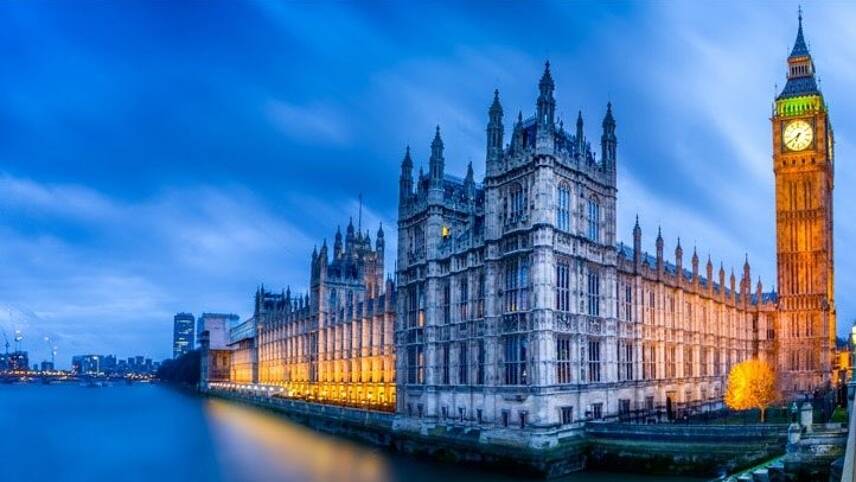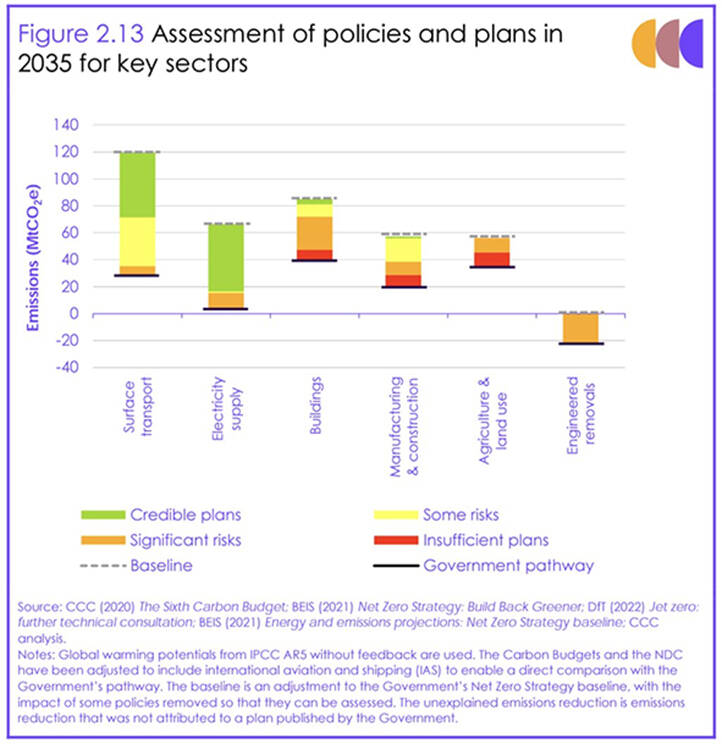Register for free and continue reading
Join our growing army of changemakers and get unlimited access to our premium content

From road expansions to the net-zero strategy, a lot of green frameworks have been challenged
Published today (29 June), the 600-page report is the first to be published since the UK Government published its Net-Zero Strategy last October, as part of a flurry of green policy changes rushed out the door ahead of COP26.
The CCC has continuously made recommendations to Government on how a net-zero target could be set and achieved by 2050. In its latest report, the CCC provides an in-depth progress report across each key sector and whether policies are enabling or hindering decarbonisation. edie has published in-depth, sector-by-sector analysis of the report, which can be read here.
There are hundreds of key messages, new recommendations and eye-catching charts that track the UK’s journey to net-zero emissions. For those who don’t have time to glance across all 600 pages, edie has summarised SEVEN key messages from the CCC’s progress report.
1) The UK is almost halfway to net-zero emissions…
The report notes that UK emissions are 47% lower than they were in 1990, despite a 4% increase last year – which is attributed to recovery from the Covid-19 pandemic. Emissions are still 10% lower than they were in 2019. This effectively means, the UK is almost halfway on its journey to reach net-zero.
The UK Government is attempting to accelerate decarbonisation across all areas of the economy, with the flagship Net-Zero Strategy acting as the umbrella that all other policies fall under.
The Net-Zero Strategy “contains warm words but little progress” on efforts to reach net-zero, with the CCC noting that the Treasury is yet to explore the costs and benefits of the net-zero transition. Specifically, the CCC calls for an urgent review of tax strategies and reforms to planning legislation to help accelerate and embed progress to net-zero.
2) …But less than 40% of future required emissions reductions are covered by policy
Its new progress report states that there are only “credible” Government plans to deliver around one-third of the emissions reductions needed to meet the Sixth Carbon Budget. A further 25% of the reductions could be delivered with rapid action outside of policymaking, but the CCC warns that the further reductions “cannot be relied on”. Delaying action, it emphasises, would ultimately push up the cost of the net-zero transition.
A lot of what is covered by policy comes in the form of the Zero Emissions Vehicle Mandate, which has helped in tackling a historical source of emissions from road transport. But there are some real problem areas that still need to be addressed, namely in the built environment in terms of heating homes and improving energy efficiency.
3) EV sales are ahead of predictions and trajectories
The CCC notes that last year’s Transport Decarbonisation Plan (TDP) has acted as a “positive step” for the sector and has built confidence in terms of decarbonisation through additional strategies based on charging infrastructure, phase outs for older, polluting vehicles and the Zero Emissions Vehicle mandate for manufacturers by 2024.
EV sales grew by 12% in the new car market in 2021, while the CCC has recommended an 8% growth. The CCC has also welcomed the creation of 28,000 public charge points across the UK, 7,600 of which were added in the last 12 months. However, the CCC notes that this is still well short of the Government’s commitment of at least 300,000 by 2030.
The report states that “decarbonisation pathway should not be all about replacing fossil-fuelled vehicles with electric ones, it also offers an important opportunity to change the way people view mobility”. The Government does have strategies in place to promote bus, rail and cycling and walking, but the CCC notes these aren’t as comprehensive as the switch to zero-emission passenger vehicles and HGVs. The CCC notes that the UK will need to limit the growth of road traffic to 2% by 2035 to allow short-term climate targets to be reached.
4) Buildings are a real problem point
Regarding buildings and heat, the CCC has singled out the UK’s housing stock as a source of emissions that will derail net-zero progress without policy interventions soon. It is emphasising that decarbonising housing is particularly important in the current context of the energy price crisis, and with Ofgem planning to increase its price cap again this winter, meaning that families could pay up to £2,700 annually for dual-fuel bills.
Energy efficiency, the CCC is pointing out, could be improved in homes swiftly with the right policy interventions. “There is a shocking gap in policy for better-insulated homes,” the CCC said in a statement. “The Government promised significant public spending in 2019 and committed to new policies last year, neither has yet occurred… the average annual energy bill for UK households is around £40 higher than if insulation rates from pre-2012 had continued for the last decade.”
The Government was able to catalyse energy efficiency upgrades in more than 150,000 homes in 2021, a 12% increase from 2020. However, the CCC states that this number needs to increase to 500,000 homes annually by 2025 and then one million per year by 2030. The CCC also notes that funding to tackle emissions from public buildings will cover less than half of the required upfront costs need to achieve the Government’s target of reducing emissions by 75% by 2037.
5) The energy crisis hasn’t been accounted for by Government
The CCC has also reflected on the ongoing energy crisis, warning that the existing funding to assist fuel-poor homes (totalling more than £8bn collectively) is “unlikely to be sufficient” as it was based on fuel poverty estimates which predate price rises. Indeed, recent research suggests that up to four million additional households could be pushed into fuel poverty in the coming years.
The Treasury has promised a consultation on to tackle pricing reforms, although this is yet to be published. The CCC states that a “clear policy decision must be made before next winter”.
It is emphasising that decarbonising housing is particularly important in the current context of the energy price crisis, and with Ofgem planning to increase its price cap again this winter, meaning that families could pay up to £2,700 annually for dual-fuel bills.
6) There could be too much reliance on unproven technology
Just look at manufacturing and construction. Emissions reductions across those sectors have historically been driven by energy efficiency measures, fuel switching and the lightweighting of materials and products.
But the Government is now focusing on nascent technologies such as hydrogen and carbon capture and storage (CCS) to help reach net-zero. While the CCC notes the potential of both these technologies and views them as crucial drivers of the transition, it does express concern as to how the Government is focusing on them.
According to the CCC, there is “significant risk” or failure to deliver, based on focusing these technologies. Current policies have focused on decarbonisation industrial sites, including a UK-wide race to create the first net-zero industrial cluster. However, the CCC warns that the focusing on industrial clusters “leaves some risk of the UK taking a more expensive decarbonisation route with lower energy security”.
The CCC points out that strategies around CCS are “showing signs of delay”, while the business model for hydrogen deployment is suffering from poor data. On CCS, the Government is aiming to have 2 MtCO2/year of industrial CCS by 2025 and 6 MtCO2/year by 2030, but the CCC claims that progress is at least a year behind schedule. There is also a risk, the CCC notes, that policy is not focusing to help decarbonise dispersed sites.
7) The UK’s land use needs a revamp
As well as focusing on carbon reductions, the CCC progress report also examines the role of nature and carbon removal technologies to help deliver the “net” aspect of net-zero.
The CCC notes that the land use sector “must become a net sink” by the mid-2030s, meaning it should be removing carbon from the atmosphere. This will require a massive uptake in peatland and woodland restoration.
The CCC notes that peatland restoration should reach 67,000 hectares/year by 2025, and in annual tree planting to 30,000 hectares by 2025 and 50,000 hectares by 2050. By 2050, woodland cover will need to increase by 5% to 18% of all UK land area, while 80% of peatland needs restoring.
However, the CCC adds that these land-use change targets are not being met. “This presents a significant risk due to the time profile of carbon sequestration in natural systems,” the report adds.
The CCC adds that tree planting rates “remain well below” existing Government commitments, and will require an increase of 4,000 hectares annually to reach 30,000 annually. The CCC notes that around one-fifth of UK land will need to be released from current agricultural practices by 2035, assisting with a wider emissions reduction target of 16 MtCO2e by 2035.



Please login or Register to leave a comment.